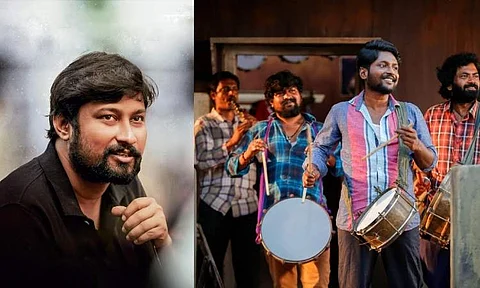

Ambajipeta Marriage Band, a social drama starring Suhas, Shivani Nagaram and Sharanya Pradeep, among others, has garnered critical acclaim and popular appreciation in equal measure, steadily running in the theatres for the last two weeks. Filmmaker Dushyanth Katikaneni reveals that he intended to make a social drama for his maiden film. “Romantic comedies are not my cup of tea. As an audience and a filmmaker, I found myself gravitating towards social dramas. I also felt responsible in a way, to come forward and depict the kind of life I have grown up seeing. There is a certain satisfaction in bringing those stories to life, challenges notwithstanding,” reveals Dushyanth. Set in the titular town on the Godavari Coast in the year of 2007, Ambajipeta Marriage Band traces the lives of identical twins Malligadu (Suhas) and Padma (Sharanya Pradeep) and their conflicts with the town’s upper-caste overlord Venkat (Nithin Prasanna). The film explores caste dynamics in a small town, through escalating conflicts, followed by a rallying cry for solidarity and choosing reason over violence. CE talks to Dushyanth about the film’s themes, its making, and what lies in store for him.
Excerpts:
You mention that your film is based on true life events right at the beginning.
The film is a collection of stories I have heard growing up. A lot of incidents that took place did not come to public attention, they were either buried by those with power or brushed aside by those without power, in order to escape trouble. I plucked a few incidents and strung a story out of them.
The way the film ends is both optimistic and subversive. It also sums up the Ambajipeta Marriage Band’s philosophy quite neatly. Was the ending real or fictional?
The last scene is fictional. It was a way of presenting my views. I wanted to break the notion that the oppressed are entirely powerless, by presenting an alternative solution that has them reclaiming their power through solidarity. It is like how that old Telugu quote goes…'a snake can stomp on a single ant but the same snake can be overpowered by an army of ants'.
Films with political overtones and social commentary are often met with widespread disagreement and cries of offence. Did that happen to Ambajipeta Marriage Band as well?
I did hear some murmurs from certain upper caste folks, who felt their community was being portrayed in a poor light but I am an upper-caste person myself. I have only displayed what has always happened, through the course of history. I have not shown anything new. And it was a conscious choice, to reveal the antagonists’ caste. We just conveyed that visually. There were some complaints, but I was also appreciated by a lot of other upper-caste folks.
Your antagonist does not react in the way we expect someone, especially in films, to react. What made you step away from the kind of shock-value cruelty we usually see in films?
I wanted the character’s reactions to be true to how people react in real life. It is important to understand that unlike films, folks think a lot about their reputation. It all boils down to their honour and standing in the society. So, if an upper caste patriarch finds out about his sister’s affair with a person from a lower caste, their plan of action will be very hush-hush. They will try to get the girl silently married off, to protect their reputation. That is how I have designed Venkat’s reactions in the film. When he eventually does something extreme, it comes off as a cumulative reaction to a chain of skirmishes.
The title comes across as a larger metaphor for ‘band’ing together against oppression. How did you stumble upon this particular title?
You are right about why this title was chosen for this film. We knew the words 'marriage' and 'band' had to be a part of the title from the beginning, but we had to brainstorm the village’s name. We did not zero in on Ambajipeta at first. At first, I thought the film would be called Chirathapudi Marriage Band. Chirathapudi is a town in the Konaseema region. It helped that we wanted the film to take place in the Godavari region, so we were looking for town names in that area. I was in Ambajipeta, in fact, when I locked Ambajipeta for the film’s title. The beauty of this particular hamlet is that you see 10-15 saloon shops lined up in a row. And people usually book bands to play at their weddings in small towns at saloon shops. It felt like a sign.
Who are the filmmakers you look up to, especially in the social drama space, and in general?
I like Vetrimaaran garu’s films a lot. Aadukulam (2011), Visaran
What are your key takeaways from making your first film? What are your plans ahead?
More than learning, I feel a greater sense of responsibility towards my work. No filmmaker is 100 percentage satisfied with their work, but in retrospect, one always feels like their work can be more detailed and layered. That is what I feel as well. A lot of creative calls I made back then, came from a place of logistical constraints or because I was not well informed. However, there is nothing you can do once the film is out. I hope to put this learning to use in my next film. I have some stories with me, but I do not want to rush. I want to make my next film only when everything is perfectly written, planned and put in place.